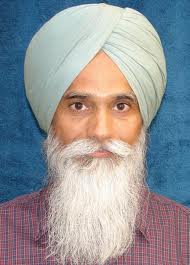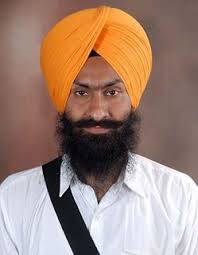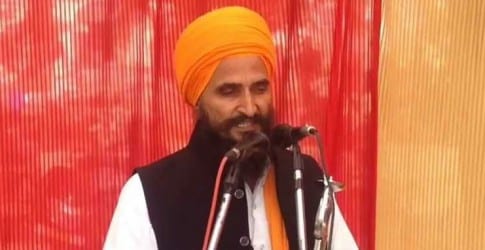(January 9, 2014)—The 44 day long hunger strike by Bhai Gurbaksh Singh Khalsa, a Kurukshetar (Haryana) based ordinary Sikh man, has received accolades from Sikhs around the world. Before him, S. Darshan Singh Feruman had sat on fast unto death to demand the formation of a separate Sikh homeland. He achieved martyrdom after a 74 day fast, however his demands were not met.
Although the release of Bhai Lal Singh Akalgarh, Bhai Gurmeet Singh, Bhai Shamsher Singh and Bhai Lakhwinder Singh was possible only on parole, this is being considered as the sole achievement of Bhai Gurbaksh Singh’s hunger strike. In addition, there are other aspects which are yet to be addressed. Sikh24.com has asked for the views of some renowned Sikh scholars and thinkers who have not only put light on these aspects, but also have analyzed various incidents connected with this episode.
S. Ajmer Singh, author of “Veehvin Sadi di Sikh Rajniti”

Ajmer Singh
I was abroad during most of the duration of this hunger strike, but what I saw at a distance is that it highlighted the issue of Sikh detainees languishing in jails in various states for decades. A hunger strike was the only weapon that could raise this issue.
Secondly, the slogan popularized by him i.e. ‘Zabar da muqabla sabar naal’, is of important significance. Before this episode, Sikhs were known for a one sided approach and have espoused the view that the peaceful way of struggle is inferior to the armed one—although instances of peaceful struggles can also be taken from older Sikh history. In the present context, Bhai Gurbaksh Singh has popularized peaceful tactics of struggle.
Another thing is that most of us are hasty by nature and find shortcuts. Although on parole, Sikh political prisoners who were being lodged in jails for decades have been released in a period when there was no hope of their release. Now we should pursue this issue in the proper way, only then can we expect to be successful in this matter.
To say this hunger strike has paved the way for new leadership of Sikhs, is the result of our ignorance and lack of a realistic view. I again repeat that we love shortcuts. What Bhai Gurbaksh Singh has done is sufficient for his personality. This is a big achievement in the sense that he has provided legitimacy to the genuine issue of Sikh political prisoners.
Dr. Gurbhagat Singh, International Sikh scholar

Dr. Gurbhagat Singh
I don’t consider this episode a big event which could be possible only when masses were aware of the cause of the activity and inspiration prevailed behind this. Nor did it spread sizable awareness among masses on the issue.
This is an achievement because it paved the way for the release of Sikh detainees but not a big achievement. And it made people conscious to an extent on human rights angle.
Parmjit Singh Gazi, former president of Sikh Student Federation

Parmjit Singh Gazi
It is a significant achievement by Bhai Gurbaksh Singh Khalsa that four Sikh political prisoners had the opportunity to be set free, although on parole.
It was the uniqueness of this strike that it did not give any chance to the government for it to be repressed. It was also not reactionary as other agitations fought by Sikhs in previous years.
Prabhjot Singh, young writer & thinker

Prbhjot Singh
I watched Bhai Gurbakhash Singh’s hunger strike closely. No doubt, as a result of this hunger strike, the issue of Sikh detainees became a burning one. He showed much determination at the initial stages of the strike but during the last days, this determination could not survive as it had before. In spite of all these aspects, he came onto the landscape with a conscience. He also played a role in the [freedom] movement. He raised the issue of human rights of Sikh political prisoners. But his contribution of awakening a section of the Panth cannot be neglected in this campaign.
Had he shown full determination till the end of the strike, circumstances would be a bit different. He would have emerged as a role model and got more response.
Bhai Gurbaksh Singh Khalsa’s cause enjoyed support from a section of the Punjab congress, some Hindu personalities and the family of Beant Singh, but this support is the result of their apprehension at the rise of a Khalistan movement. Otherwise, these sections would not have backed such kinds of activities.
Mandhir Singh, young thinker and activist

Mandhir Singh
The first result observed of this hunger strike is that the Panth is still ready for struggle for truth if the proper platform or leadership is provided to it. This kind of environment also materialized on the issues of Dera Sirsa and death sentences for Bhai Balwant Singh Rajoana and Prof. Devinder Pal Singh Bhullar. This episode should be seen in this series.
Notwithstanding the single penal code (IPC) in India and the legal system, detainees are divided into three categories—ordinary prisoner, political prisoner and terrorists. So far, Sikh detainees in India have been placed in the third category which is considered the most notorious category. Thanks to the hunger strike by Bhai Gurbaksh Singh Khalsa, Sikh detainees have begun to be regarded as political prisoners by the political class and media.
The third main achievement of this hunger strike is that it caused awareness to be spread among the majority of people, especially Sikhs and concerned persons about the ill-treatment of Sikh prisoners and violations of the rule of law.
A section of Panthik Sikhs feels disappointment because the end of this strike was not met with their aspirations and they thought that a powerful Sikh leadership did not emerge. Whenever such kind of agitation is fought, a section of Panthik Sikhs begin to hope that new leadership would emerge out of this development, because a vacuum exists in regard to powerful panthik leadership. Like previous Sikh agitations, this one could also not yield such leadership that is why the very section has been disappointed.
It is the general attitude of our people that we start to give stress on producing our future leadership instead of concentrating on the issue. If we would have focus on the issue, it would prove more beneficial for the nation.
The leadership can emerge as a quick process only when somebody sacrifices, and for an evolutionary process, it demands determination.
As far as an overall movement for the Sikhs, expressions of resentment against the state were the most powerful when the Dera Sirsa-Sikh row was sparked. Before that, Sikhs showed powerful resentment over the issue of Bhaniarewala. On the issue of the death sentence for Bhai Rajoana and Prof. Bhullar, Sikhs fought a more effective agitation than that of Bhai Gurbaksh Singh Khalsa. Thus during previous years, mainly five powerful agitations were witnessed by us and a complete vacuum was not seen. This indicates that Sikhs have been struggling as a martial nation regularly but this expression was in the form of flickers. Due to the absence of powerful leadership, the movement is not enjoying consistency.
A process of evolution is going on through all these events. If we state that the Panth has become conscious, we are wrong. A single event doesn’t have the ability to make a community conscious. Single events are steps that awake us. Bringing back old Saroops of Guru Granth Sahib from the time of Guru Hargobind ji possessed by the Indian army during June, 1984 from the Sikh Reference Library, is more important than getting 6 Sikh detainees released, but agitation on the former issue will get no response from people, much like the hunger strike. This is because the Panth is not fully conscious.
A response to the hunger strike was given by various factions not because of political consciousness but because of the pity taken by them on Sikh prisoners languishing for 18+ years. We are not even fully conscious on the issue of Sikh political prisoners. During the hunger strike, a large number of speakers expressed their views but nobody mentioned the case of those seven Sikhs who were awarded the sentence of ten years each just a few months back without any concrete evidence.
Altogether, we can regard it as an achievement—but not a big achievement. One more important thing is that in spite of the pressure of the state, people showed determination in favour of Bhai Gurbaksh Singh Khalsa.
Editor’s Note: The views expressed above are not necessarily endorsed by Sikh24.com.


